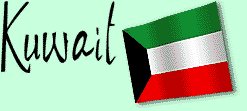





The State of Kuwait lies at
the north-west extreme of the Arabian (Persian) Gulf, bordered to the north-west
by Iraq, and to south by Saudi Arabia. The State comprises a mainland region
and nine small islands. The largest Kuwaiti island is Bubiyan, although
the most populous is Failaka. Immediately to the south of Kuwait, along
the Gulf, lies a neutral (Partitioned) Zone of 5,700 sq km, which is shared
between Kuwait and Saudi Arabia.The total land area of kuwait is 17,818
sq km. kuwait shares 464 km of boundries with its neighbours. 242 km with
iraq, and 222 km with Saudi Arabia. The capital of Kuwait is Kuwait City.
Much of the country is arid desert, and the climate is generally hot and
humid. Summer temperatures may exceed 50 degrees C (122 degrees F), and
in january, the coldest month, temperatures range between -2.8 degrees
C and 28.3 degrees C (27 to 85 degrees F). Annual rainfall varies from
10mm (0.4 in) to 370mm (14.6 in). The official language is Arabic, which
is spoken by virtually all Kuwaiti nationals (estimated, on the basis of
later definition, to have comprised 28.6% of Kuwait's population at mid-1990)
and by many of the non-Kuwaiti residents of the country. English is also
used in commercial circles. The Kuwaiti inhabitants are mainly Muslims.
However, adherents of other religious beliefs can freely practice their
rituals in Kuwait. Muslims in kuwait comprise 85% of the total population
(kuwaitis+non kuwaitis). Kuwait has had a remarkable recovery from the
Iraqi invasion of 1990. The oil well fires were put out in less than a
year, when many people estimated it would take two years or more. Driving
around Kuwait, there is very little visible evidence of the war which occured,
and life is, for the most part, back to normal. However, there are still
scars on the environment which may take years to repair. People holding
Western passports will find it relatively easy to get a visa to visit friends
and relatives in Kuwait. Contact the Kuwaiti Embassy in your country (some
phone numbers provided below) for full details. Kuwait is a small and relatively
open economy with proven crude oil reserves of about 94 billion barrels
- 10% of world reserves. Kuwait has rebuiltits war-ravaged petroleum sector;
its crude oil production at least 2.0 million barrels per day by the end
of 1993. The government ran a sizable fiscal deficit in 1993. Petroleum
accounts for nearly half of GDP and 90% of export and government revenues.
CLICK HERE
IF YOU WANT TO SEE PICTURES OF KUWAIT
AND CLICK HERE IF YOU WANT
TO HEAR THE KUWAITI RADIO
Please vote for me to get the best arabic site on the net